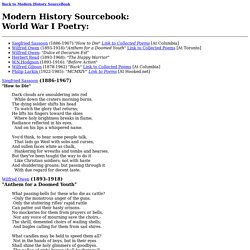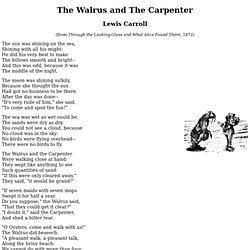

British War Poetry-WWI. Back to Modern History SourceBook Siegfried Sassoon (1886-1967):"How to Die" Link to Collected Poems [At Columbia] Wilfred Owen (1893-1918):"Anthem for a Doomed Youth" Link to Collected Poems [At Toronto] Wilfred Owen: "Dulce et Decorum Est"Herbert Read (1893-1968): "The Happy Warrior"W.N.Hodgson (1893-1916): "Before Action"Wilfred Gibson (1878-1962) "Back"Link to Collected Poems [At Columbia] Philip Larkin (1922-1985): "MCMXIV" Link to Poems [At Hooked.net] Siegfried Sassoon (1886-1967) "How to Die" Dark clouds are smouldering into red While down the craters morning burns.

The dying soldier shifts his head To watch the glory that returns; He lifts his fingers toward the skies Where holy brightness breaks in flame; Radiance reflected in his eyes, And on his lips a whispered name.You'd think, to hear some people talk, That lads go West with sobs and curses, And sullen faces white as chalk, Hankering for wreaths and tombs and hearses. Wilfred Owen (1893-1918) "Anthem for a Doomed Youth"
AP Poetry Terms. AP English Poetry Terms (Presented by Dennis Carroll of High Point University at AP Workshop) Listed and defined below are literary terms that you will need to know in order to discuss and write about works of poetry.

You are already familiar with many of these. l. alliteration- the repetition of identical or similar consonant sounds, normally at the beginnings of words. “Gnus never know pneumonia” is an example of alliteration since, despite the spellings, all four words begin with the “n” sound. 2. allusion- a reference in a work of literature to something outside the work, especially to a well-known historical or literary event, person, or work. 3. antithesis- a figure of speech characterized by strongly contrasting words, clauses, sentences, or ideas, as in “Man proposes; God disposes.” 4. apostrophe- a figure of speech in which someone (usually, but not always absent), some abstract quality, or a nonexistent personage is directly addressed as though present.
Milton! The Walrus & The Carpenter. (from Through the Looking-Glass and What Alice Found There, 1872) The sun was shining on the sea, Shining with all his might: He did his very best to make The billows smooth and bright-- And this was odd, because it was The middle of the night.

The moon was shining sulkily, Because she thought the sun Had got no business to be there After the day was done-- "It's very rude of him," she said, "To come and spoil the fun! " The sea was wet as wet could be, The sands were dry as dry. You could not see a cloud, because No cloud was in the sky: No birds were flying overhead-- There were no birds to fly. The Walrus and the Carpenter Were walking close at hand; They wept like anything to see Such quantities of sand: "If this were only cleared away," They said, "it would be grand!
" "If seven maids with seven mops Swept it for half a year. "O Oysters, come and walk with us! " "But wait a bit," the Oysters cried, "Before we have our chat; For some of us are out of breath, And all of us are fat! "